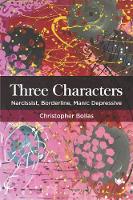Three Characters: Narcissist, Borderline, Manic Depressive

Book Details
- Publisher : Karnac Books
- Published : 2021
- Cover : Paperback
- Pages : 120
- Category :
Psychoanalysis - Catalogue No : 95471
- ISBN 13 : 9781912691814
- ISBN 10 : 9781912691
Reviews and Endorsements
‘this book is worth the investment of both reading and thinking about. […] The book takes the reader, sometimes at breath-taking speed, through Bollas’s ideas about character developed over 30 plus years of clinical work and writing. Through his dissecting and describing the lived experiences of the various character structures, the reader is offered a way of thinking about clinical work with these sufferers. […] Bollas’s endeavour to understand the territory and to give his patients the space to be who they are comes through. In answer to one of the questions, Bollas writes of ‘the right of free speech in analysis’ (p. 67). I think the book shows something of how he has tried to demonstrate this in his writing as well as how he tries to give this freedom to his patients.’
Jan McGregor, British Journal of Psychotherapy 38, 1
‘Bollas’ insights have a searing humanity, and his descriptions are memorably evocative […] I felt my understanding of people, and mental pain in general, being profoundly enhanced by this book.’
Isobel Todd, Psychodynamic Counsellor, in SCAP News No.142, 2021
'Three Characters is a short book tightly focussed on the theory and practice of intensive psychoanalysis. [...] Thanks to its genesis in years of lecturing and teaching, Three Characters is written in a vivid, free-flowing, and mostly jargon-free style that allows ample scope for a reader's wider reflection on how the ideas in the book might be relevant outside the consulting room. [...] As well as its obvious clinical applicability, one might wonder if this book would be a useful resource for a character development workshop in a creative writing group; this would make sense in the context of Bollas’s decades-long mission to elucidate the contribution of unconscious creativity to human development and psychoanalytic work.'
Alexander Pearce, Psychodynamic Practice

